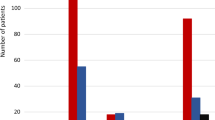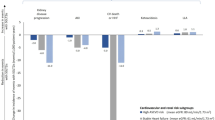Abstract
Rationale
It is possible that amisulpride, with its unique receptor binding profile, is not associated with significant weight gain, a serious side effect of most “atypical” antipsychotic drugs. While most “atypicals” have a high affinity for both dopamine and serotonin receptors, amisulpride has only dopamine receptor action.
Objectives
To analyse the weight gain associated with amisulpride.
Methods
A pooled database of prospective randomised amisulpride studies was analysed. The mean weight gain after 10 weeks of treatment was estimated by regression analysis.
Results
Eleven studies with a total of 1422 patients were pooled, providing 1392 patients who were eligible for evaluation. In the main analysis of all effective doses (50–1200 mg/day) the mean weight gain associated with amisulpride at 10 weeks was 0.8 kg, 95% CI (0.48–1.18). Linear regression showed no dependence of weight gain on daily dose levels (P=0.7). When patients with mean daily doses below 400 mg/day were excluded in a sensitivity analysis, the mean weight gain at ten weeks was again 0.80 kg, 95% CI (0.47–1.16) with n=874. The mean weight gain at study endpoints in 1-year studies was 1.4 kg, 95% CI (0.85–1.90), n=548.
Conclusion
Amisulpride is an atypical antipsychotic associated with low weight gain.
Similar content being viewed by others
References
Allison DB, Mentore JL, Heo M, Chandler LP, Cappelleri JC, Infante MC, Weiden PJ (1999) Antipsychotic-induced weight gain: a comprehensive research synthesis. Am J Psychiatry 156:1686–1696
Boyer P, Lecrubier Y, Puech AJ, Dewailly J, Aubin F (1995) Treatment of negative symptoms in schizophrenia with amisulpride. Br J Psychiatry 166:68–72
Brecher M, Rak IW, Melwin K, Jones AM (2000) The long-term effect of quetiapine (SeroquelTM) monotherapy on weight in patients with schizophrenia. Int J Psych Clin Pract 4:287–291
Bressan RA, Erlandsson K, Jones HM, Mulligan R, Flanagan RJ, Ell PJ, Pilowsky LS (2003) Is regionally selective D2/D3 dopamine occupancy sufficient for atypical antipsychotic effect? An in vivo quantitative (123I) epidepride SPET study of amisulpride-treated patients. Am J Psychiatry 160:1413–1420
Carrière P, Lempérière T, Bonhomme D (2000) Amisulpride study group: amisulpride has a superior benefit:risk profile to haloperidol in schizophrenia: results of a multicentre, double-blind study. Eur Psychiatry 15:321–329
Colonna L, Saleem P, Dondey-Nouvel L, Rein W (2000) Amisulpride study group: long-term safety and efficacy of amisulpride in subchronic or chronic schizophrenia. Int Clin Psychopharmacol 15:13–22
Costa e Silva JA (1989) Comparative double-blind study of amisulpride versus haloperidol in the treatment of acute psychotic states. In: Amisulpride. Expansion scientifique francaise, Paris, pp 93–104
Danion JM, Rein W, Fleurot O (1999) Improvement of schizophrenic patients with primary negative symptoms treated with amisulpride. Am J Psychiatry 156:610–616
Delcker A, Schoon ML, Oczkowski B, Gaertner HJ (1990) Amisulpride versus haloperidol in treatment of schizophrenic patients—results of a double-blind study. Pharmacopsychiatry 23:125–130
Jody D, Saha AR, Iwamoto T, Biswas D, Lin C, Marcus R, McQuade RD (2002) Meta-analysis of weight effects with aripiprazole. Int J Neuropsychopharmacol 5:S186
Klein HE, Dieterle D, Rüther E, Eben E, Nedopil N, Hippius H (1985) A double-blind comparison of amisulpride vs. haloperidol in acute schizophrenic patients. In: Pichot P, Berner P, Wolf R, Thau K (eds) Psychiatry, “The state of the art”. Plenum Press, Cambridge Mass., pp 687–691
Leucht S, Pitschel-Walz G, Engel R, Kissling W (2002) Amisulpride—an unusual atypical antipsychotic. A meta-analysis of randomized controlled trials. Am J Psychiatry 159:180–190
Loo H, Poirier-Littre MF, Theron M, Rein W, Fleurot O (1997) Amisulpride versus placebo in the medium-term treatment of the negative symptoms of schizophrenia. Br J Psychiatry 170:18–22
Möller HJ, Boyer P, Fleurot O, Rein W (1997) Improvement of acute exacerbations of schizophrenia with amisulpride: a comparison with haloperidol. Psychopharmacology 132:396–401
Mota Neto JNE, Lima MS, Soares BO (2002) Amisulpride for schizophrenia (Cochrane Review). In: The Cochrane Library. Update Software, Oxford
NICE—National Institute for Clinical Excellence (2002). Guidance on the use of newer (atypical) drugs. Technology appraisal guidance No 43. www.nice.org.uk
Paillère-Martinot ML, Lecrubier Y, Martinot JL, Aubin F (1995) Improvement of some schizophrenic deficit symptoms with low doses of amisulpride. Am J Psychiatry 152:130–134
Perrault GH, Depoortere R, Morel E, Sanger DJ, Scatton B (1997). Psychopharmacological profile of amisulpride: an antipsychotic drug with presynaptic D2/D3 dopamine receptor antagonist acitivity and limbic selectivity. J Pharmacol Exp Ther 280:72–83
Peuskens J, Bech P, Möller HJ, Bale R, Fleurot O, Rein W (1999) Amisulpride study group: amisulpride vs. risperidone in the treatment of acute exacerbations of schizophrenia. Psychiatry Res 88:107–117
Pichot P, Boyer P (1988) Etude multicentrique controlée en double insu: amisulpride (Solian 200) versus halopéridol à forte dose dans les états psychotiques aigus. Ann Psychiatr 3:326–332
Pichot P, Boyer P (1989) Controlled double-blind multi-centre trial of low dose amisulpride versus fluphenazine in the treatment of the negative syndrome of chronic schizophrenia. In: Amisulpride. Expansion scientifique francaise, Paris, pp 125–137
Puech A, Fleurot O, Rein W (1998) Amisulpride, an atypical antipsychotic, in the treatment of acute episodes of schizophrenia: a dose-ranging study vs. haloperidol. Acta Psychiatr Scand 98:65–72
Rak IW, Jones AM, Raniwalla J, Phung D, Melvin K (2000) Weight changes in patients treated with Seroquel (quetiapine). Schizophr Res 41:206
Reynolds GP (1997) What is an atypical antipsychotic. J Psychopharmacol 11:195–199
Rüther E, Blanke J (1988) Therapievergleich von Aminosultoprid (DAN 2163) und Perazin bei schizophrenen Patienten. In: Helmchen H, Hippius H, Tölle R (eds) Therapie mit Neuroleptika—Perazin. Thieme Verlag, Stuttgart, pp 65–71
Saletu B, Küfferle B, Gruenberger J, Földes P, Topitz A, Anderer P (1994) Clinical, EEG Mapping and psychometric studies in negative schizophrenia: comparative trials with amisulpride and fluphenazine. Pharmacopsychiatry 29:125–135
Scatton B, Claustre Y, Cudenned A, Oblin A, Perrault G, Sanger DJ, Schoemaker H (1997) Amisulpride: from animal pharmacology to therapeutic action. Int Clin Psychopharmacol 12:S29–S36
Schoemaker H, Claustre Y, Fage D, Rouquier L, Chergui K, Curet O, Oblin A, Gonon F, Carter C, Benavides J, Scatton B (1997) Neurochemical characteristics of amisulpride, an atypical dopamine D2/D3 receptor antagonist with both presynaptic and limbic selectivity. J Pharmacol Exp Ther 280:83–97
Sèchter D, Peuskens J, Fleurot O, Rein W, Lecrubier Y (2002) Amisulpride study group: amisulpride vs. risperidone in chronic schizophrenia: results of a 6- month double-blind study. Neuropsychopharmacology 27:1071–1081
Speller JC, Barnes TRE, Curson DA, Pantelis C, Alberts JL (1997) One-year, low-dose neuroleptic study of in-patients with chronic schizophrenia characterised by persistent negative symptoms—amisulpride v. haloperidol. Br J Psychiatry 171:564–568
Taylor DM, McAskill R (2000) Atypical antipsychotics and weight gain—a systematic review. Acta Psychiatr Scand 101:416–432
Wahlbeck K, Tuunainen A, Ahokas A, Leucht S (2001) Drop-out rates in randomised antipsychotic drug trials. Psychopharmacology 155:230–233
Wetzel H, Grunder G, Hillert A, Philipp M, Gattaz WF, Sauer H, Adler G, Schroder J, Rein W, Benkert O (1998) Amisulpride versus flupentixol in schizophrenia with predominantly positive symptomatology—a double-blind controlled study comparing a selective D-2-like antagonist to a mixed D-1-/D- 2-like antagonist. Psychopharmacology 137:223–232
Ziegler B (1989) Study of the efficacy of a substituted benzamide amisulpride, versus haloperidol, in productive schizophrenia. In: Amisulpride. Expansion scientifique francaise, Paris, pp 73–81
Acknowledgements
This study was supported in part by a grant from Sanofi-Synthélabo, who provided us with unrestricted access to their data. Company personnel were not involved in the analysis of the data, nor did they have any authority over the publication. No funds were paid directly to the authors. We are indebted to Hans-Jörg Baurecht for his excellent assistance in the management of the database.
Author information
Authors and Affiliations
Corresponding author
Rights and permissions
About this article
Cite this article
Leucht, S., Wagenpfeil, S., Hamann, J. et al. Amisulpride is an “atypical” antipsychotic associated with low weight gain. Psychopharmacology 173, 112–115 (2004). https://doi.org/10.1007/s00213-003-1721-6
Received:
Accepted:
Published:
Issue Date:
DOI: https://doi.org/10.1007/s00213-003-1721-6




